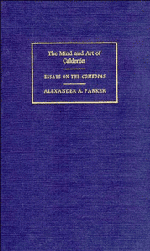Book contents
- Frontmatter
- Contents
- Author's preface
- Editor's preface
- Introduction
- I Stylistic and dramatic craftsmanship
- 1 Principles of interpretation
- 2 From metaphor to symbol
- 3 The dramatic structure of El alcalde de Zalamea
- 4 ‘Poetic truth’ in the shaping of plots
- 5 The Coriolanus theme: Las armas de la hermosura
- II From experience to myth
- III The tensions of social life
- IV The tensions of public life
- V From symbol to myth
- Epilogue
- Notes
- Index
1 - Principles of interpretation
Published online by Cambridge University Press: 05 February 2012
- Frontmatter
- Contents
- Author's preface
- Editor's preface
- Introduction
- I Stylistic and dramatic craftsmanship
- 1 Principles of interpretation
- 2 From metaphor to symbol
- 3 The dramatic structure of El alcalde de Zalamea
- 4 ‘Poetic truth’ in the shaping of plots
- 5 The Coriolanus theme: Las armas de la hermosura
- II From experience to myth
- III The tensions of social life
- IV The tensions of public life
- V From symbol to myth
- Epilogue
- Notes
- Index
Summary
The revaluation of ‘baroque’ poetry in Spain started shortly before the tricentenary of Góngora's death in 1627 and proceeded rapidly thereafter. Round about the same time Ángel Valbuena Prat attempted to associate a ‘Vuelta a Calderón’ (Return to Calderón) with the fashionable ‘Vuelta a Góngora’, but though a new interest in Calderón can be said to date from this time, he lagged far behind the new interest in Góngora. Culterano, or ‘Gongoristic’, vocabulary and metaphors in the dramatist were evidence of the extensive influence of Góngora in Spain towards the end of his life, but they did not serve as tools for dramatic criticism, especially since the interest in Góngora's poetry scarcely carried, at that time, an interest in his subject-matter. Dramatic poetry, being written for an audience, must have something to say. The ‘intentional fallacy’ theory, which maintains that we cannot and must not attempt to extract from a poetic work what the authors had in mind when writing it, cannot possibly apply to writing for the stage. A stage play had to communicate ideas through poetic dialogue and action, and those ideas had to give the action unity and purpose. Unless the poetry of drama expresses these ideas, in the way proper to drama, it will only give rhetorical colour, a range of intensified emotions, and excitement. This will not represent human life in action in a way that can lead the audience to pass judgements on it.
- Type
- Chapter
- Information
- The Mind and Art of CalderónEssays on the Comedias, pp. 13 - 24Publisher: Cambridge University PressPrint publication year: 1989



